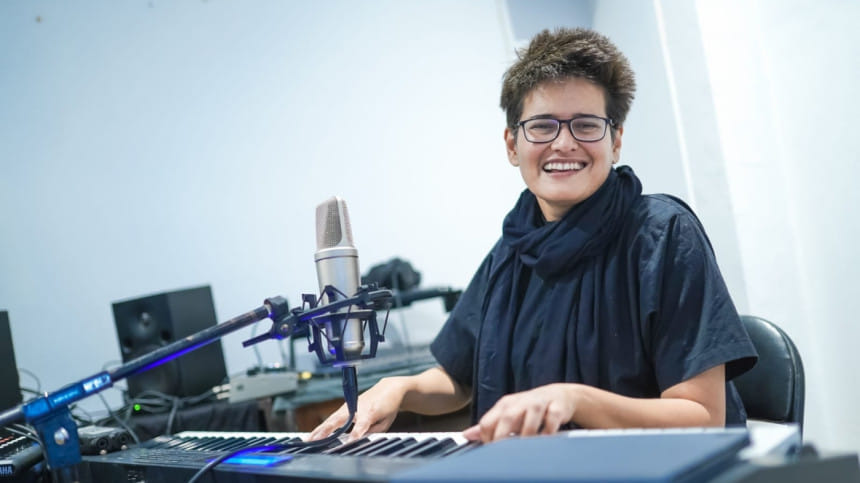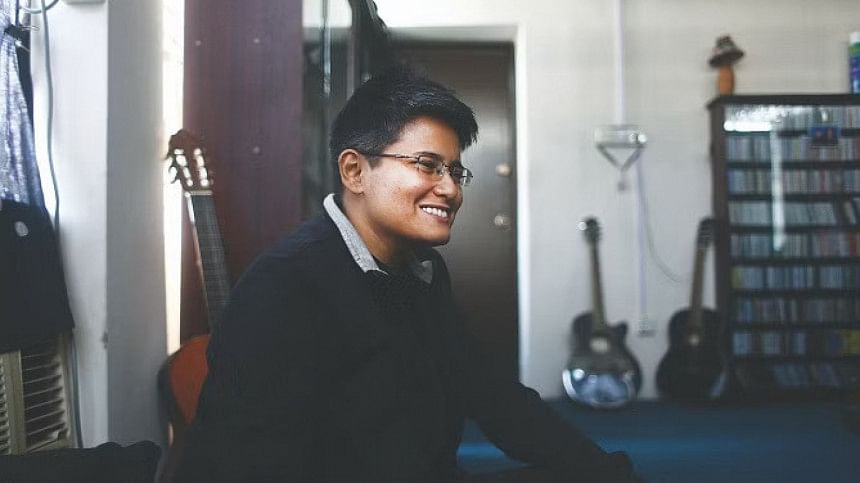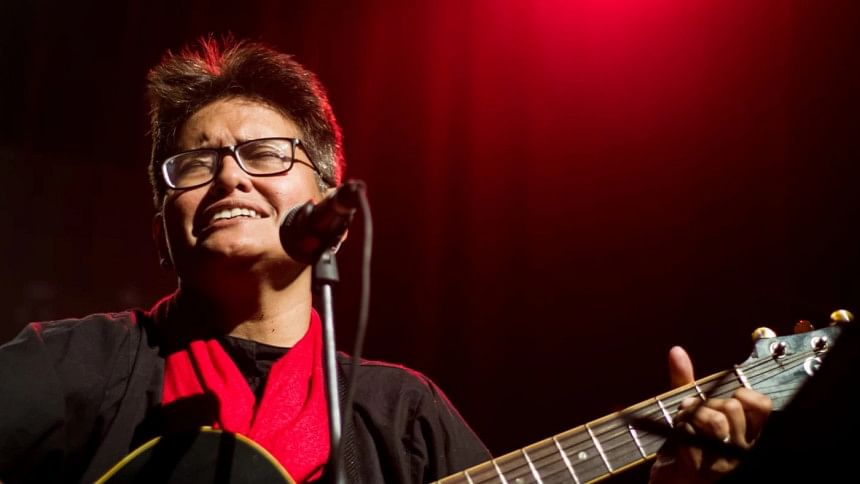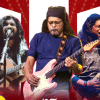Shayan: Of music and defiance

"Bhoy Banglay, Bhoy Banglay, Bhoy Banglay Bhoy,
Ei Bangla Shudhu Tader Ar Onno Karo Noy."
These simple yet powerful lines reflect the essence of many songs penned by Farzana Wahid Shayan.
For her, what began as a way to hold onto connections evolved into a unique musical journey. Rejecting commercial norms, the musician describes her work as "life songs" — raw and spontaneous expressions of her experiences.

Shayan's work is a blend of personal reflection and sharp social commentary, involving themes from lost relationships to biting political critiques. In songs like "Jonotar Beyadobi", "Bhoy Banglay Bhoy", "Ei Meye Shon", and "O Neta Bhai", she speaks not just of struggles, but of hope for a better world, calling for collective action against injustice.
In an exclusive interview with The Daily Star, Shayan shared insights into her creative process, inspirations, and her plans for the future.

What messages do you hope to convey at your upcoming concert, 'Gaane Gaane Shayan', and how does it reflect your growth as an artiste?
For "Gaane Gaane Shayan", I feel both excitement and nervousness. Performing solo again after a long break is challenging but thrilling. I can't pre-plan my emotions—everything will unfold naturally. My main goal is to reconnect with the audience. As for my growth as an artiste, it's a continuous process and I'm eager to share this experience with the audience.
Why did you choose music as your medium of protest, from songs like 'Abrar Fahad' to 'Aamar Naam Palestine'?
Music is the only language I truly understand. It's my way of processing and responding to injustices—whether it's the oppression of Palestinians or issues in Bangladesh. Music isn't just an expression; it's how I engage with the world and it allows me to make sense of the chaos around me.

Do you ever feel isolated in your stance due to a lack of support from contemporaries?
Not at all. I don't expect others to join my protests. Everyone has their own way of expressing themselves and I don't impose my beliefs on others. A protest can be powerful even when only one person stands up. I believe in my path and I tread forward, regardless of external support.
Can you share your creative process for songwriting and composition?
My songwriting often starts with raw emotions derived from painful events, like the death of Abrar Fahad. It's an ache that forces me to look away from the world and confront my grief. Music is how I cope with the chaos—writing, composing, and performing help ease the burden, even temporarily.
My music is deeply personal, shaped by my raw emotions. I don't create for commercial success. Whether a song becomes popular doesn't matter as long as it reflects my experiences and emotions.

What drives you to participate in protests despite concerns about being politically labelled?
I don't mind being politically labelled because I consider myself a political person. I know my values and the kind of world I want to live in. Joining protests has allowed me to connect with others and find solidarity. Labels are inevitable, and I've accepted that people will interpret my actions in their own way.
How do you balance being an artiste and an activist, and how do you choose the issues to highlight in your music?
For me, there's no separation between social, political, and personal issues. If something doesn't feel personal, I won't engage with it. When I sing about issues like Palestine, it's because I feel deeply affected. While some may label me an activist, I see myself simply expressing my reality through music.

How important is it for artistes to defy expectations, and what impact do you think this has on listeners and society?
My goal isn't to challenge societal norms but to remain true to myself in a world that imposes expectations. By doing so, I hope to inspire others to embrace their individuality. By defying these norms, I aim to live authentically. The impact on listeners is subjective—they're free to interpret my work however they wish.
How has your career evolved, and what challenges have you faced?
The most rewarding part of my career has been connecting with people daily. The biggest challenge has been sustaining myself through music, especially without mainstream success. Balancing music with my legal job was tough, as were societal judgments. Societal labelling and slander were difficult, but they're part of everyone's journey. Despite these struggles, I'm grateful for the opportunities I've had.

How do you compare today's political climate to the era of the fascist regime?
There's no comparison. A fascist regime suppresses expression and instils fear, whereas today's political chaos stems from people's mistakes and inexperience. While I'm not content with the current situation, I'd still choose it over the repression of a fascist regime.
What projects are you currently working on, and what are your future plans?
I'm focused on recording and publishing both old and new songs, as well as some poetry. Moving forward, I'll continue making music and cherishing time with loved ones. I'll keep responding to the world around me, be it through songs of joy, protest, or even satire.

 For all latest news, follow The Daily Star's Google News channel.
For all latest news, follow The Daily Star's Google News channel. 








Comments